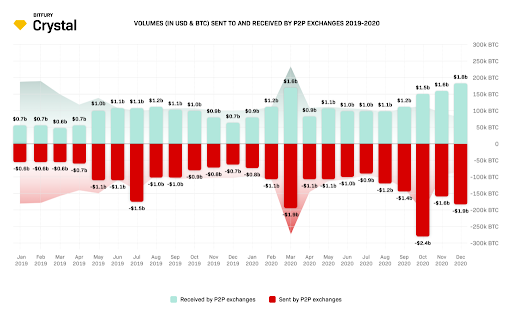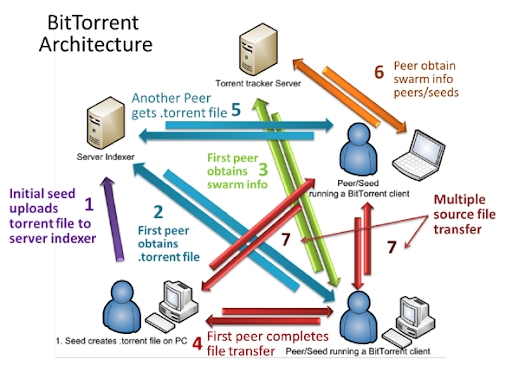What is P2P Crypto Exchange and How Does Peer-to-Peer Works?

The most valuable digital asset in the modern virtual economy is cryptocurrency. This virtual currency has endured numerous obstacles and setbacks since its inception in order to reach its current position. Additionally, the number of people using these crypto assets has grown over time. Its advantages over other types of crypto exchanges have led to a growing demand for cryptocurrency exchange platforms, particularly for the Peer-To-Peer P2P crypto exchange method.
Highlights
Peer-to-peer (P2P) cryptocurrency exchanges are essentially platforms where users may trade digital currency directly with one another. A P2P exchange gives traders the freedom to choose the other traders they want to trade with, unlike centralized or decentralized exchanges.
By using these services, you may look through a seller’s list and pick the one that offers the best payment option without giving up control of your assets. A peer-to-peer (P2P) cryptocurrency exchange lacks a single point of failure in contrast to centralized exchanges.
Regarding peer-to-peer exchange, a decentralized method of trading crypto tokens. It makes it possible for buyers and sellers to agree on the token price before a transfer is made. According to Coin Market Cap, there are already about 9,000 cryptocurrencies with a market value of almost $2 trillion.
Investors from all over the world are eager to trade in this rapidly increasing market as a result of its growing popularity. As a result, there has been a murder of blockchain exchanges. On the other hand, peer-to-peer trading platforms are sometimes praised for having transparent, decentralized networks and extremely secure trade mechanisms. So what are these networks? How do they work? Keep reading to get your questions answered.
Peer To Peer (P2P) Crypto Exchange – Defined
Peer-to-peer, or P2P, is a popular approach that allows users to trade, buy, and sell cryptocurrencies without the assistance of a third party.
Thus, this is simply between the two traders, and software typically makes it possible. These are generally well-known in nations with somewhat severe exchange restrictions; P2P, on the other hand, has fewer regulations, making it a popular option in nations like India.
The majority of P2P networks link buyers and sellers, match price ranges, and ensure the security of financial transactions while preventing fraud. In addition, it’s an excellent way to trade because it opens up a variety of payment choices, like PayTm wallet, Net Banking, IMPS, and UPI, that are otherwise not easily accessible on exchanges.

Source: Crystal Blockchain
P2P trading is extremely popular since it offers quicker trades, more payment alternatives, and withdrawal options. In addition, when the platform is more secure and does not permit any central authority to handle your cash, it will be regarded as the best trading practice.
P2P offers certain advantages also, such as,
- Absence of middleman
- Asset control
- Embellished privacy
- Greater adoption
Trading on a P2P platform offers the greatest cryptocurrency exchange experience due to its high level of security, transparency, and other factors.
Certain Parameters that Make P2P Crypto Exchange Efficient
The P2P crypto exchange development differs from other crypto exchange business models in a number of ways. Users favor the P2P crypto exchange over other methods due to these factors. And a few of them, among others, that make P2P cryptocurrency trading superior to other models are as follows.
- No transaction cost
- Flexible prices
- Privacy
- No third-party involvement
How Does Peer-To-Peer Network Work?
P2P trading can be compared to a matchmaking system where buyers and sellers are linked for potential trades. Like other exchanges, these sites do not impose transaction fees and demand that users keep their money in a digital wallet under their independent management.
Users can come to marketplaces like Facebook or Craigslist due to P2P exchanges that link cryptocurrency merchants and consumers. They can therefore browse cryptocurrency adverts or make their own.
In this network, safety is provided by ratings or feedback. As a result, before entering any transaction, you can research the reputation of the buyers or sellers of assets on P2P networks.
Consider the following example to understand the concept better.
- Imagine John places a 3 BTC buy order. In contrast, Diana placed a sale order for 3 BTC. A peer-to-peer trading platform matches John with Diana, enabling them to enter into a contract without the use of a third party.
- Until they reach an agreement on the parameters of the trade, the smart contract-driven Escrow holds 3 BTC of Diana. John transfers the required money to Diana’s account. Once Diana approves the payment, Escrow releases 3 BTC and delivers them to John’s wallet address.
Banks and other financial institutions handle this procedure in conventional finance. These organizations are in charge of holding and moving money across accounts. They confirm transactions as well as document them in their ledgers.
Since all participants in P2P trading have identical rights and obligations, third parties are not required. Instead, to validate transactions and stop double spending, the system uses consensus techniques. As a result, every member of the network possesses a copy of the ledger that details all transactions made by every other member of the network.
Take a Quick Look At Types of P2P Network
Let’s quickly review the different P2P network types to understand better how P2P networks operate. There are numerous P2P networks available in the crypto exchange sector, including,
- Structured network
- Unstructured network
- Hybrid model
Each type has its own benefits and drawbacks. Let’s discuss each in detail.
Structured Network

Source: Research Gate
Unlike an unstructured network, a structured P2P peer-to-peer network has adequate node or topology indexing, making it simpler to search for a particular piece of data within it.
A distributed hash table is used to index the nodes in this type of network. Like how we often visit a page in a book by looking through the index rather than searching through all of the pages.
A perfect example of this kind of network is BitTorrent. The above image clearly depicts how BitTorrent makes it easy for users to share data with peers.
Unstructured Data
Nodes/peers in an unstructured network continue to link to one another at random. Thus, neither a structure nor a rule exists. Just connect and let the network expand.
In this architectural style, the nodes are not indexed in case we need to look for certain data. Due to the O(n) time complexity, where n is the number of nodes in the network, we are forced to search across each and every node to find our data. This uses a lot of resources.
For instance, a social platform on an unstructured peer-to-peer network can be utilized effectively because people regularly join and leave the network. These networks are simple to construct, but because search queries are broadcast throughout the entire network, they consume a lot of memory and CPU. Therefore, it can take some time if the information you’re looking for is only on 5% of the computers.
Hybrid Structure
A hybrid P2P network combines a client/server and P2P paradigm on a single platform. The network makes use of an index server that stores information about where resources are located at the center. It makes use of this server for searches as well.
It may be cherry-picking the advantageous aspects of both models and creating an awesome model. However, there are times when we need both client-server and P2P architectural functionalities. An illustration of a hybrid model architecture is Spotify.
Salient Features of Suitable P2P Platform
Today, entrepreneurs find crypto business ideas more lucrative but must be made aware of their features and functionalities. We will assist you at every stage to ensure your P2P bitcoin exchange solution beats the competition. If you already have a plan and an idea, great. If not, we will recommend that features, functions, and designs offer distinctive and sophisticated solutions. The list of features found in most exchange platforms today is provided below.
Automated KYC
Nowadays, an exchange platform must have automated KYC, ID, and AML verification. It enables the administrator to swiftly and effectively locate the appropriate people for better solutions. Additionally, it gets rid of risk elements like hackers.
User-friendly Interface
The platform should feature a user-friendly design that makes it simple and quick for you to process and manage your trades and find the cryptocurrencies you’re looking for.
Dedicated Customer Support
Is the customer service responsive and reachable? See if they provide support services around-the-clock. Find out when they are active and see whether it works for you if that isn’t an option. Test their response time as well to confirm availability and support.
Multi-layer Security
One of the key characteristics of a crypto exchange is security. Make sure to strengthen your P2P exchange with the appropriate security elements, such as:
- Integration of SSL
- Two-factor authentication
- HTTP Parameter pollution protection
- Email / Google Authenticator
- Anti-Denial of Service (DoS)
Escrow System
There are many smart contract development tools, but a smart contract-based Escrow account that permits trading between traders is one of the fundamental features of a P2P exchange. The assets of sellers are placed in Escrow as soon as a trade is completed. The assets are taken out of Escrow and sent to the buyer’s cryptocurrency wallet once the buyer’s payment has been verified.
Hire the Most Reliable Blockchain Development Company
Since there is no central authority to set pricing, many individuals think P2P crypto trading can be more profitable than traditional exchanges. P2P crypto exchanges can, therefore, frequently provide better exchange rates and reduced costs, allowing you to increase your profits while trading cryptocurrencies.
Elluminati, a blockchain development company, delivers a feature-rich P2P crypto exchange with microservice architecture, advanced standards, and security implementation. So what are you waiting for? Contact us today and share your business ideas with our experts.



